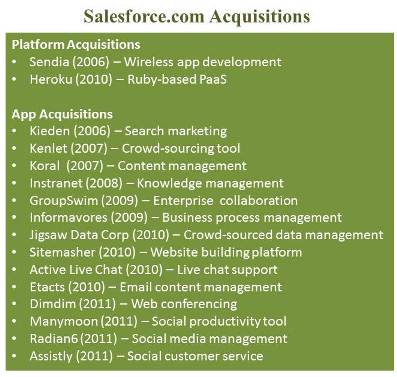If you keep up with CRM news, you might have noticed the announcement of Salesforce’s acquisition of Model Metrics, a consulting firm that helps companies with mobile and social cloud deployments. This is the most recent in an impressive series of acquisitions by Salesforce over the past few years. Acquisition has been a key component of their growth strategy, and they seem to have focused in two areas: platform and applications.
Salesforce started as a sales force automation software vendor and has built a profitable company based on applications, but Benioff has voiced his intent to become a platform provider. The creation of Force.com was a huge step in that direction. So where is their real focus? And where will they acquire next? I will look at both sides – platform and application – and discuss Salesforce’s strategy in both areas. Then I will leave it up to you, the reader, to make a guess.
Before we start with that, though, let’s take a look at their past acquisitions.
Applications tell a story
One of the many areas where Salesforce excels is marketing. Salesforce has realized that people don’t identify with a piece of software. They identify with stories, and that is what applications and the social enterprise provide. A really good story.
Additionally, applications are currently where Salesforce is making the bulk of their income. The Sales and Service Clouds drive the largest percentage of their annual revenue. So, it isn’t likely that Salesforce will drop their focus on those cash cows any time soon. Therefore, if they continue to focus on applications, here are some likely routes they will take:
- They will expand to focus on the SMBs. Salesforce got its start in the SMB space, but then they set their sights on more lofty goals. However, the recent acquisition of Assistly, a company that plays in the SMB space, suggests an attempt on behalf of Salesforce to get back to serving the SMBs.
- They will continue to fill gaps in their apps. While Salesforce has a very comprehensive set of apps, there are still holes in the app layer. The largest one by far is marketing automation (MA). Salesforce has yet to create a marketing cloud that is on par with the offerings of some of the leading MA vendors.
- They will capitalize on the success of the HR market. Salesforce has always been good at picking up on trends. Human Resources software is experiencing impressive growth and has lent itself well to the growing SaaS environment. It is entirely possible that Salesforce will purchase a small HR product and use that intellectual property to develop its own Force.com-based HR product.
Competing on the platform
As mentioned earlier in this article, Salesforce has always been focused on the platform, and for good reason. All of Salesforce’s major competitors have a platform. Oracle and Microsoft both recently developed cloud platforms, in addition to their existing platform offerings, so if Salesforce wants to truly compete, Platform-as-a-Service is the way to go.
Additionally, the platform will produce more recurring revenue in the long term. Initially, it is cheaper to develop and maintain than applications are, but going forward, it will serve as the foundation of the app ecosystem. Developers will be able to build on it, and customers can run all of their business needs on top of it. This is definitely an area where we can expect future acquisitive activity. Here are some possible routes:
- They will build out the technology stack. When Salesforce first released Force.com, they received a lot of negative feedback because they technology was limited in terms of who could develop on it. Since then, they have made steps to open the platform up. VMForce opened it up for Java developers, and Heroku opened it for Ruby on Rails developers. Salesforce will likely continuing expanding their platform, and will also expand in mobile to increase accessibility.
- They will expand to ERP. While this seems like a prediction for an app acquisition, I’m making the argument that in order to really compete on the cloud platform, Salesforce must also have a full ERP offering. This is because Salesforce’s biggest competitors have already released their cloud platforms, as mentioned above. When these vendors achieve functional parity in the cloud, Salesforce will likely have to expand as well to remain relevant in the enterprise.
To weigh in on where you think Salesforce is going to acquire next, visit Software Advice and cast your vote in the survey at the bottom of the page.
Lauren Carlson is a CRM Analyst at Software Advice.

